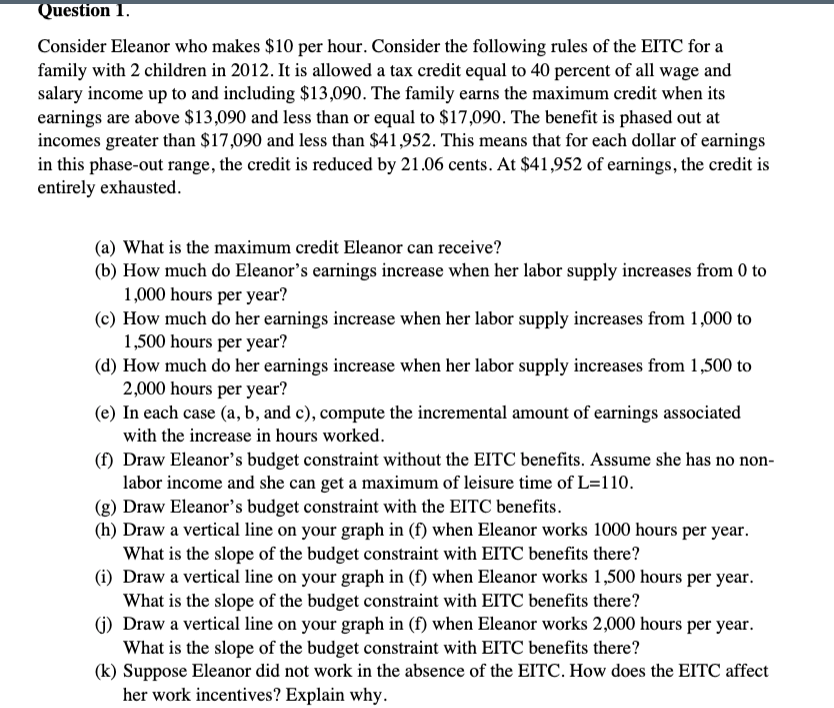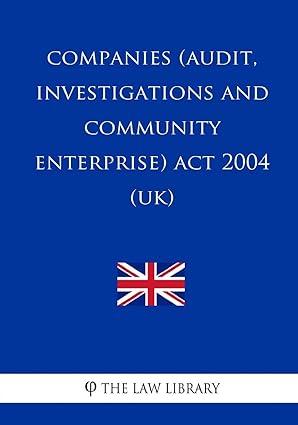 Note: I already found A-D, am having trouble with the rest
Note: I already found A-D, am having trouble with the rest
Question 1. Consider Eleanor who makes $10 per hour. Consider the following rules of the EITC for a family with 2 children in 2012. It is allowed a tax credit equal to 40 percent of all wage and salary income up to and including $13,090. The family earns the maximum credit when its earnings are above $13,090 and less than or equal to $17,090. The benefit is phased out at incomes greater than $17,090 and less than $41,952. This means that for each dollar of earnings in this phase-out range, the credit is reduced by 21.06 cents. At $41,952 of earnings, the credit is entirely exhausted. (a) What is the maximum credit Eleanor can receive? (b) How much do Eleanor's earnings increase when her labor supply increases from 0 to 1,000 hours per year? (c) How much do her earnings increase when her labor supply increases from 1,000 to 1,500 hours per year? (d) How much do her earnings increase when her labor supply increases from 1,500 to 2,000 hours per year? (e) In each case (a, b, and c), compute the incremental amount of earnings associated with the increase in hours worked. (f) Draw Eleanor's budget constraint without the EITC benefits. Assume she has no non- labor income and she can get a maximum of leisure time of L=110. (g) Draw Eleanor's budget constraint with the EITC benefits. (h) Draw a vertical line on your graph in (f) when Eleanor works 1000 hours per year. What is the slope of the budget constraint with EITC benefits there? (i) Draw a vertical line on your graph in (f) when Eleanor works 1,500 hours per year. What is the slope of the budget constraint with EITC benefits there? (j) Draw a vertical line on your graph in (f) when Eleanor works 2,000 hours per year. What is the slope of the budget constraint with EITC benefits there? (k) Suppose Eleanor did not work in the absence of the EITC. How does the EITC affect her work incentives? Explain why. Question 1. Consider Eleanor who makes $10 per hour. Consider the following rules of the EITC for a family with 2 children in 2012. It is allowed a tax credit equal to 40 percent of all wage and salary income up to and including $13,090. The family earns the maximum credit when its earnings are above $13,090 and less than or equal to $17,090. The benefit is phased out at incomes greater than $17,090 and less than $41,952. This means that for each dollar of earnings in this phase-out range, the credit is reduced by 21.06 cents. At $41,952 of earnings, the credit is entirely exhausted. (a) What is the maximum credit Eleanor can receive? (b) How much do Eleanor's earnings increase when her labor supply increases from 0 to 1,000 hours per year? (c) How much do her earnings increase when her labor supply increases from 1,000 to 1,500 hours per year? (d) How much do her earnings increase when her labor supply increases from 1,500 to 2,000 hours per year? (e) In each case (a, b, and c), compute the incremental amount of earnings associated with the increase in hours worked. (f) Draw Eleanor's budget constraint without the EITC benefits. Assume she has no non- labor income and she can get a maximum of leisure time of L=110. (g) Draw Eleanor's budget constraint with the EITC benefits. (h) Draw a vertical line on your graph in (f) when Eleanor works 1000 hours per year. What is the slope of the budget constraint with EITC benefits there? (i) Draw a vertical line on your graph in (f) when Eleanor works 1,500 hours per year. What is the slope of the budget constraint with EITC benefits there? (j) Draw a vertical line on your graph in (f) when Eleanor works 2,000 hours per year. What is the slope of the budget constraint with EITC benefits there? (k) Suppose Eleanor did not work in the absence of the EITC. How does the EITC affect her work incentives? Explain why
 Note: I already found A-D, am having trouble with the rest
Note: I already found A-D, am having trouble with the rest





